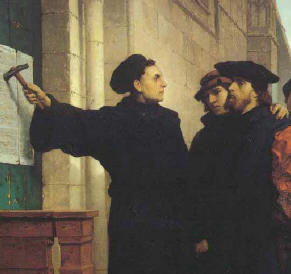|
"Unless I
am convicted by scripture and plain reason - I do not
accept the authority of the popes and councils, for they
have contradicted each other - my conscience is captive
to the Word of God. I cannot and I will not recant
anything for to go against conscience is neither right
nor safe. God help me. Amen."
These words concluded Luther's
address to the representative of the papacy when he was
asked to recant his writings on salvation by grace alone
and the authority of Scripture alone or face
excommunication, a virtual death sentence.
Martin Luther, was born November
10, 1483 in Eisleben in which is not Germany.
During a thunderstorm in 1505, Luther in fear of his
life, made a commitment to God that he would become a
monk if he were saved. He entered the Augustianian
monastery in Erfurt. During his stay, Luther was
never able to find peace and assurance regarding his
personal salvation. At this time, Jesus was seen
as the most righteous judge not so much as Savior.
Luther could not feel that he was ever the kind of
person that Jesus could accept. His confessor
encouraged him to pursue doctoral studies and later to
accept a teaching position at the new university in
Wittenberg, thinking such activities would engage
Luther's mind and quell his anxiety and distress.
This would prove to be the case, but not in the way the
confessor thought.
In 1513 Luther began to lecture on
the Pslams and began to see a God of grace and mercy in
the Scriptures. Later in 1515-1516 as he turned to
Romans, Luther began to discover that the "righteousness
of God" was not based on the sinner meeting some
standard of behavior that would justify them in the
sight of God, but rather was a free gift of God's mercy
as sinners were declared to be righteous because of the
saving work of Jesus Christ on the cross. Luther's
anxieties had been quelled by the simple words of
Romans:
19 Now we know that whatever
the Law says, it speaks to those who are under the
Law, so that every mouth may be closed and all the
world may become accountable to God;20 because by
the works of the Law no flesh will be justified in
His sight; for through the Law comes the knowledge
of sin. 21 But now apart from the Law the
righteousness of God has been manifested, being
witnessed by the Law and the Prophets, 22 even the
righteousness of God through faith in Jesus Christ
for all those who believe; for there is no
distinction; 23 for all have sinned and fall short
of the glory of God, 24 being justified as a gift by
His grace through the redemption which is in Christ
Jesus; 25 whom God displayed publicly as a
propitiation in His blood through faith. This was to
demonstrate His righteousness, because in the
forbearance of God He passed over the sins
previously committed; 26 for the demonstration, I
say, of His righteousness at the present time, so
that He would be just and the justifier of the one
who has faith in Jesus. 27 Where then is boasting?
It is excluded. By what kind of law? Of works? No,
but by a law of faith. 28 For we maintain that a man
is justified by faith apart from works of the Law.
(Romans 3:19-28)
Knowing that others felt the same
anxiety that Luther had felt, he began to preach a nd
teach this message of salvation. In 1517, a
firestorm of discussion would erupt that would quickly
evolve into what is now called the "Reformation".
When a representative of the church came to town selling
indulgences (for a price a person could secure the
release of oneself or another from purgatory or a
reduction in sentence), Luther could not tolerate the
spiritual bondage the people of the church had imposed
on them by its leadership. He challenged the
church's "selling" of what God gave away for free in the
Gospel. He posted 95 theses, or statements, on the
door of the Castle church in Wittenberg to begin
discussion on this matter. Soon controversy would
erupt. There were those who saw Luther's point. Church
leaders saw this as a direct challenge to their
authority and station. nd
teach this message of salvation. In 1517, a
firestorm of discussion would erupt that would quickly
evolve into what is now called the "Reformation".
When a representative of the church came to town selling
indulgences (for a price a person could secure the
release of oneself or another from purgatory or a
reduction in sentence), Luther could not tolerate the
spiritual bondage the people of the church had imposed
on them by its leadership. He challenged the
church's "selling" of what God gave away for free in the
Gospel. He posted 95 theses, or statements, on the
door of the Castle church in Wittenberg to begin
discussion on this matter. Soon controversy would
erupt. There were those who saw Luther's point. Church
leaders saw this as a direct challenge to their
authority and station.
Soon Luther would find himself
before the representative of the pope being order to
recant from his positions and writing on salvation by
grace and on criticism of those who would lead the
church and yet claim authority to sell indulgences and
to proclaim other errors in disagreement with the Holy
Scriptures. His refusal to recant would lead to
his excommunication by the Roman church. The
leader of Saxony, Elector Duke Fredrick, secretly had
Luther kidnapped to secure his safety. Hidden
away, Luther began translating the Bible into German so
that his people could read the Word of God and decide on
these matters for themselves.
Luther would spend his life as a
vocal leader proclaiming the Gospel of salvation by
grace alone, through faith alone, as revealed in the
Scripture alone, because Christ alone accomplished it.
He was a prolific writer and preacher who never stopped
defending salvation by the grace and mercy found in
Jesus Christ. Luther married and had children.
He passed away in 1546.
 click to learn more about Luther's Seal
click to learn more about Luther's Seal
See longer article
The Life
and Work of Martin Luther
 |